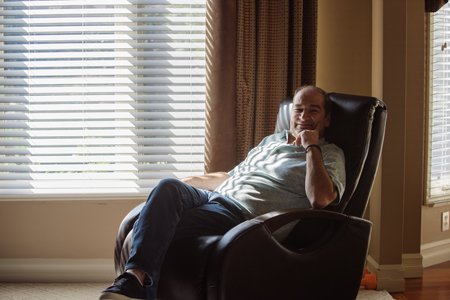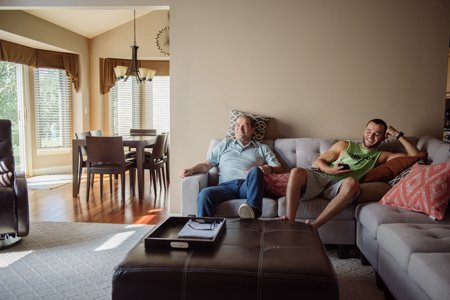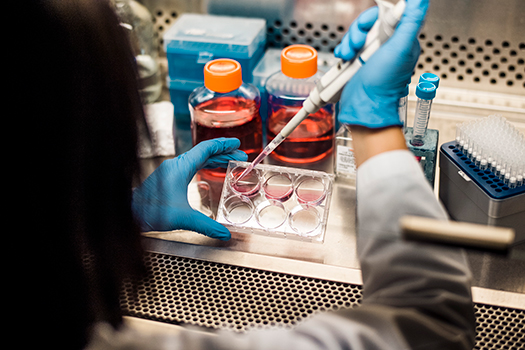Lung Cancer Screening Program
Lung cancer screening has shown that we can detect cancer much earlier in people most at risk.
When Francesco Antonucci first told his family he had a tumor in his chest and an advanced form of lung cancer, he had no idea how they would react.
“I was sitting outside at home in August 2015, thinking, when my brother-in-law called me,” Antonucci says. “I told him the situation, and he said, ‘You know, it doesn’t sound so bad.’ I said, ‘What?’ He said ‘You’ve just got the one tumor. It’s not all over the place. That’s not bad!’”
 Antonucci’s doctors, however, were more realistic. They informed him that the survival rate for those diagnosed with stage 3B non-small cell lung cancer was low (about 5 percent over five years).
Antonucci’s doctors, however, were more realistic. They informed him that the survival rate for those diagnosed with stage 3B non-small cell lung cancer was low (about 5 percent over five years).
“Most people were telling me to go home and live whatever life I had left,” Antonucci says. “I think when you’re given such a diagnosis, you’re willing to do or try anything.”
For Antonucci, that meant enrolling in a clinical trial.
At the time of his diagnosis, Antonucci was a 51-year-old father of two living in Macomb Township. He’d been a lifelong smoker and had never been able to quit for very long. When the diagnosis came in, he immediately stopped smoking and began treatment.
Frank confessed that the consequences of his smoking had a lasting effect on his family, even admitting that his family went through more during his treatment than he did!
Initially, Dr. Igor Rybkin, a medical oncologist with Henry Ford Health treated the cancer with a combination of radiation and chemotherapy — a best standard of care available at that time, since the disease was too advanced to be removed surgically. For a while, the treatment seemed to work. A year later, in August 2016, Frank’s cancer returned as a metastatic disease, meaning that it spread to different parts of the body.
“The recurrence of his disease was quite dramatic,” Dr. Rybkin says. “The cancer spread to his brain, causing changes in his mental status and requiring urgent admission to the Emergency Room. I thought that if anything was going to help him, it would be something well outside of best standard of care.”
A month after the cancer spread, Dr. Rybkin offered to enroll Antonucci in an early-stage clinical trial for metastatic lung cancer patients at Henry Ford Cancer. The trial, dubbed CheckMate-568, was designed to make use of immunotherapy, a process that helps boost a patient’s immune system to fight cancer.
In the trial, patients received two medications: nivolumab and ipilimumab, two immune check point inhibitors – drugs that essentially allow a person’s immune system to work in overdrive.
Within the first few weeks of the trial, Antonucci started noticing improvements. His pain began to subside and he no longer needed high doses of morphine, nor did he check back in to the hospital.
“I started coming back, slowly but surely,” Antonucci says.
Still, over the next two years of immunotherapy treatment, other complications arose.
In December 2016, he was hospitalized for a hematoma in his thigh with development of compartment syndrome. The condition prevented him from walking and required urgent vascular surgery and evacuation of one-and-a-half pints of blood from his leg.
 Eventually, though, his condition started to improve and although he had some additional minor issues, he was able to make a family trip to his parents’ homeland in Italy.
Eventually, though, his condition started to improve and although he had some additional minor issues, he was able to make a family trip to his parents’ homeland in Italy.
In September 2018, after the two year-clinical trial came to a close, Antonucci’s cancer was no longer disabling. He felt like he’d regained his strength and his mind was functioning properly again.
Several months later, in April 2019, an MRI of the brain and CT of his body showed no visible signs of cancer.
“There’s no doubt in my mind,” Dr. Rybkin says. “If not for the combination immunotherapy used in this trial, he would not have such a great and durable control of the cancer.”
Today, Antonucci is currently in the surveillance phase of the clinical trial with regularly performed imaging studies and visits with his oncologist. He’s medically retired from his job as a specialized electrician for Ford Motor Company and continues to live a life cancer-free at home in Macomb. When he’s not spending time with his family, he enjoys traveling and spreading his message of positive, forward thinking – especially for others who are facing a cancer diagnosis.
“When you’re diagnosed with cancer, you get knocked down a few times along the way,” Antonucci says. “Just move through it. Don’t get stuck in it. Keep looking forward. I had a lot happen to me, but I’m here and I’m happy to be here.”
Lung cancer screening has shown that we can detect cancer much earlier in people most at risk.


If you were diagnosed with lung cancer we may have a clinical trial for you.
We use cookies to improve your website experience. By using this site, you agree to our Terms of Use. Read our Internet Privacy Statement to learn what information we collect and how we use it.